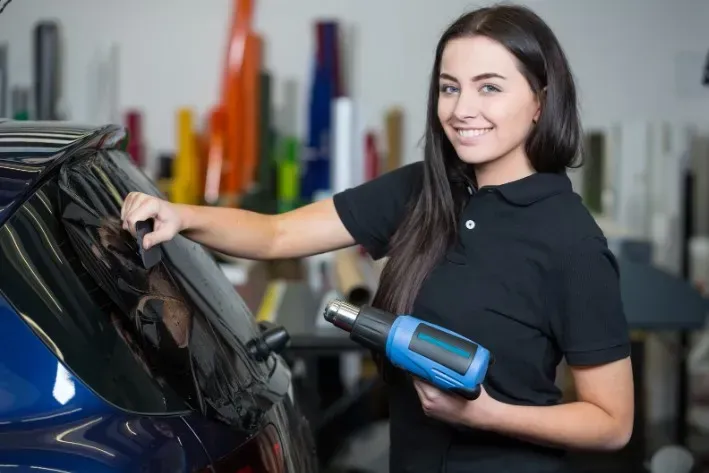
Blogs
Window Tinting Insights: Expert Tips, Trends, and Solutions
Discover the Latest in Window Film Technology and Applications

Pros and Cons of Different Window Tinting Films
Are you looking for a way to upgrade your car’s appearance and comfort? If so, you might want to consider window tinting. Window tinting is the process of applying a thin film of material to your car windows to reduce the amount of light and heat that enters your vehicle. Window tinting can also provide privacy, security, and aesthetic benefits. But not all window tinting films are created equal. There are different types of window tinting films that vary in quality, durability, performance, and cost. In this blog post, we will explore the pros and cons of some of the most popular window tinting films on the market, including dyed, metalized, ceramic, and carbon films.
Dyed Window Tinting Film
Dyed window tinting film is one of the cheapest and most common types of window tinting film. It is made by applying a layer of dye to a polyester base. The dye absorbs some of the sunlight and prevents it from reaching your car interior. Dyed window tinting film can provide a dark and uniform look to your car windows, as well as some privacy and glare reduction. However, dyed window tinting film has some drawbacks. It can fade over time due to exposure to UV rays, which can make it less effective and less attractive. It can also interfere with some electronic devices, such as GPS and radio signals. Dyed window tinting film is best suited for people who want a low-cost and simple window tinting solution.
Pros: Cheap, dark, uniform
Cons: Fades, interferes with electronics
Metalized Window Tinting Film
Metalized window tinting film is another type of window tinting film that is relatively inexpensive and widely available. It is made by applying a layer of tiny metallic particles to a polyester base. The metallic particles reflect some of the sunlight and heat away from your car interior, which can keep your car cooler and more comfortable. Metalized window tinting film can also provide a shiny and sleek look to your car windows, as well as some privacy and glare reduction. However, metalized window tinting film also has some disadvantages. It can interfere with some electronic devices, such as GPS and radio signals, even more than dyed window tinting film. It can also be prone to scratches and corrosion, which can affect its appearance and performance. Metalized window tinting film is best suited for people who want a durable and reflective window tinting solution.
Pros: Durable, reflective, cool
Cons: Interferes with electronics, scratches, corrodes
Ceramic Window Tinting Film
Ceramic window tinting film is one of the most advanced and expensive types of window tinting film. It is made by applying a layer of ceramic nanoparticles to a polyester base. The ceramic nanoparticles block some of the sunlight and heat without affecting the visibility or color of your car windows. Ceramic window tinting film can provide a clear and natural look to your car windows, as well as excellent privacy and glare reduction. Ceramic window tinting film also has some advantages over other types of window tinting film. It does not interfere with any electronic devices, such as GPS and radio signals. It does not fade or scratch easily, which makes it very durable and long-lasting. It also has high resistance to UV rays and infrared rays, which can protect your car interior from fading and cracking. Ceramic window tinting film is best suited for people who want a high-quality and high-performance window tinting solution.
Pros: Clear, natural, excellent
Cons: Expensive
Carbon Window Tinting Film
Carbon window tinting film is another type of window tinting film that is advanced and costly. It is made by applying a layer of carbon fiber to a polyester base. The carbon fiber absorbs some of the sunlight and heat without affecting the visibility or color of your car windows. Carbon window tinting film can provide a matte and stylish look to your car windows, as well as great privacy and glare reduction. Carbon window tinting film also has some benefits over other types of window tinting film. It does not interfere with any electronic devices, such as GPS and radio signals. It does not fade or scratch easily, which makes it very durable and long-lasting. It also has high resistance to UV rays and infrared rays, which can protect your car interior from fading and cracking. Carbon window tinting film is best suited for people who want a trendy and modern window tinting solution.
Pros: Matte, stylish, great
Cons: Costly
To sum up, there are various types of window tint films available in the market, each with its own advantages and disadvantages. Depending on your needs, preferences, and budget, you can choose the best option for your vehicle. Here are some key points to remember when comparing different window tint films:
Dyed window tint films are the cheapest and most common option, but they tend to fade over time and offer less heat rejection and UV protection than other types of films.
Metalized window tint films are more durable and reflective than dyed films, but they can interfere with electronic signals and devices in your car, such as GPS, radio, and cell phones.
Carbon window tint films are a newer option that uses nano-carbon technology to create a matte finish and a high level of heat rejection and UV protection. They do not fade or interfere with electronic signals, but they are also more costly than other types of films.
Ceramic window tint films are the most advanced and expensive option, using ceramic particles to create a clear and crisp appearance and a superior level of heat rejection, UV protection, glare reduction, and signal clarity. They are also the most durable and resistant to scratches, fading, and shattering.
As you can see, there is no one-size-fits-all solution when it comes to window tint films. You have to weigh the pros and cons of each type of film and decide what works best for you. If you need more guidance or assistance, feel free to contact us at (224) 208-8023 or visit our website bridgeautoworks.com for more information. We hope this blog post has been helpful and informative for you. Thank you for reading!
Our Services
Full Vehicle Tint
Rear Half Tint
Front Half Tint
Windshield Sunstrip/Brow
Headlight Tint
Taillight Tint
Our Services
Full Vehicle Tint
Rear Half Tint
Front Half Tint
Windshield Sunstrip/Brow
Headlight Tint
Taillight Tint
Operating Hours
Monday - Saturday 8 am to 6 pm. Sunday closed
Socials
Working Hours
Monday - Saturday 8 am to 6 pm. Sunday closed
© Copyright 2024. All Right Reserved.

